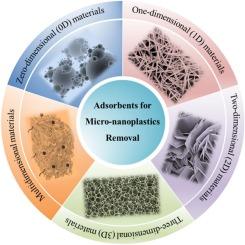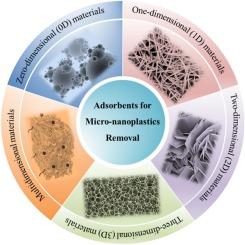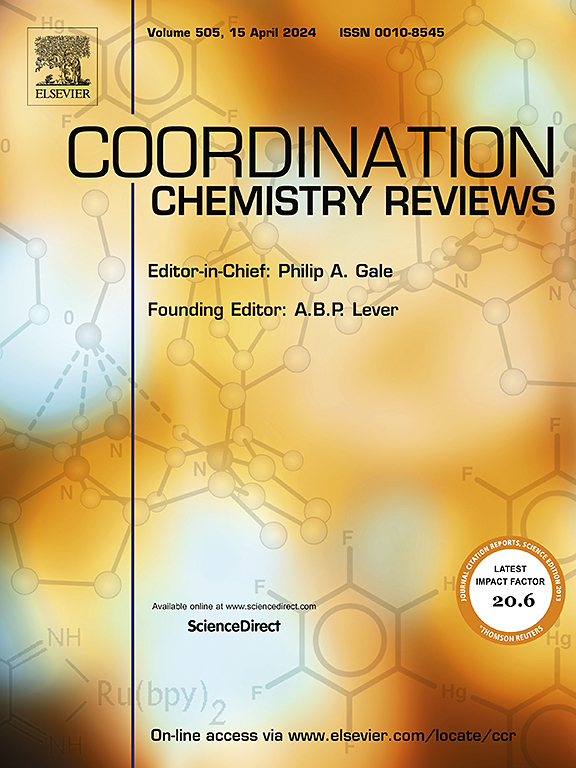Dimensional engineering of advanced adsorbents for mitigating micro-nanoplastics pollution
IF 23.5
1区 化学
Q1 CHEMISTRY, INORGANIC & NUCLEAR
引用次数: 0
Abstract
Micro-nanoplastics are now recognized as globally distributed pollutants. Their significance arises from their environmental persistence, ecotoxicity, and bioaccumulation potential. Conventional wastewater treatment technologies exhibit limited efficiency in removing micro-nanoplastics, creating a critical need for the development of advanced, sustainable sorbent materials. In this review, we propose a novel framework by classifying micro-nanoplastics adsorbents based on their structural dimensionality (0D, 1D, 2D, 3D, and multidimensional), thereby offering a fresh and insightful perspective on the evolution of material design. This dimensional engineering strategy allows systematic analysis of adsorption mechanisms, optimization of material architecture, and elucidation of synergistic effects in multidimensional composites. We provide a comprehensive overview of design principles, synthesis routes, and functional modifications, highlighting how dimensional tailoring governs sorption efficiency and environmental applicability. Finally, we identify critical challenges and outline future research pathways to guide innovation in advanced micro-nanoplastics remediation technologies.


微纳塑料污染高级吸附剂的尺寸工程研究
微纳米塑料是一种全球性的污染物。它们的重要性来自于它们的环境持久性、生态毒性和生物蓄积性。传统的废水处理技术在去除微纳米塑料方面表现出有限的效率,这就迫切需要开发先进的、可持续的吸附材料。在这篇综述中,我们提出了一种基于结构维度(0D, 1D, 2D, 3D和多维)对微纳塑料吸附剂进行分类的新框架,从而为材料设计的发展提供了一个新的和有见地的视角。这种维度工程策略允许系统地分析吸附机制,优化材料结构,并阐明多维复合材料的协同效应。我们提供了设计原则、合成路线和功能修改的全面概述,强调了尺寸裁剪如何控制吸附效率和环境适用性。最后,我们确定了关键的挑战,并概述了未来的研究途径,以指导先进的微纳米塑料修复技术的创新。
本文章由计算机程序翻译,如有差异,请以英文原文为准。
求助全文
约1分钟内获得全文
求助全文
来源期刊

Coordination Chemistry Reviews
化学-无机化学与核化学
CiteScore
34.30
自引率
5.30%
发文量
457
审稿时长
54 days
期刊介绍:
Coordination Chemistry Reviews offers rapid publication of review articles on current and significant topics in coordination chemistry, encompassing organometallic, supramolecular, theoretical, and bioinorganic chemistry. It also covers catalysis, materials chemistry, and metal-organic frameworks from a coordination chemistry perspective. Reviews summarize recent developments or discuss specific techniques, welcoming contributions from both established and emerging researchers.
The journal releases special issues on timely subjects, including those featuring contributions from specific regions or conferences. Occasional full-length book articles are also featured. Additionally, special volumes cover annual reviews of main group chemistry, transition metal group chemistry, and organometallic chemistry. These comprehensive reviews are vital resources for those engaged in coordination chemistry, further establishing Coordination Chemistry Reviews as a hub for insightful surveys in inorganic and physical inorganic chemistry.
 求助内容:
求助内容: 应助结果提醒方式:
应助结果提醒方式:


